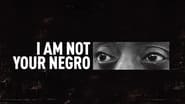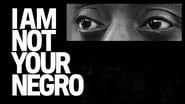sergelamarche
Great time capsule of James Baldwin who went to Paris to heal his bruised psyche by the USA. He was a writer and argued with passion about the trouble with his co-citizens. The WASP invader still hangs on today.
Karl Self
First of, you have to hand it to Samuel Jackson. He could make my tax statement sound captivating. Next, director Raoul Peck manages to back him up with a stunning visual collage of archive footage.So "I Am Not Your Negro" is a surprisingly easy watch, despite the fact that it is based on an unfinished script by James Baldwin So why is this movie called "I Am Not Your Negro"? I don't know. And in any case, I don't want "you" to be my negro. Baldwin's text is called, equally obliquely, but less catchily, "Remember This House".What I got from this movie was that James Baldwin was a trained preacher, who tried to be an acolyte to far more charismatic civil rights activists (in the case case of Malcolm X, black racist) Malcolm X and Martin Luther King Jr., who were murdered before they were 40 years old (and in Malcolm's case, by black henchmen of his own cult). The film has to pussyfoot around the fact that two other protagonists of the era, the Kennedy brothers, were also murdered, despite the fact that they were not downtrodden and as white as the cliffs of Dover.Baldwin is seen trying to convince liberal white Americans, who were all for civil rights in the first place, that fighting racism was somehow not an act of altruism but somehow would contribute to their own betterment.And also that the white sheriff in "In The Heat Of The Night" and "Mr. Tibbs" have an erotic tension going on between them.
Abdirashid Diriye Kalmoy
The nominee for the best documentary feature at the 89th academy awards, I Am Not Your Negro is already considered a cinematic spectacle in its own essence by a variety of critics. The poignant and cogent documentary is realistically scathing the contemporary and prevalent disenfranchisement of African-Americans with a retrospective narration of civil rights era's horrendous and dehumanizing conditions that prevailed less than a generation ago.The principle figure in the documentary is the celebrated African- American essaying and novelist James Baldwin (1924-1987). It is based on his unfinished manuscript of the novel Remember This House in which he documented his personal views on the civil right movement, the precarious conditions of African-Americans and his engagements with civil rights activists like Medgar Evers(1925- 1963), Malcolm X(1925-1965) and Martin Luther King Jr (1929-1968) who were all assassinated for their stance and activism on equality, civil liberty and the emancipation of African-Americans from a system that oriented its legitimacy and policies on slavery and Jim crow heritage.The documentary director is the Haitian filmmaker Raoul Peck. We remember him from his existentially nuanced works, like the documentary Lumumba (2000) which is about the Congolese freedom fighter and first prime minister of independent Congo Patrice Lumumba(1925-1961) who also demised at the hands of US and Belgium intelligence operatives. It is narrated by Samuel L. Jackson with a sonorous voice that arrests the viewers attention and initiates an irresistible compassionate empathy for the 'lived experiences' of African-Americans. Raoul Peck draws much of the narrated script from letters and notes written by James Baldwin during the 1960s and 1970s and wove video clips melodiously with them, and the result is a sublime and original documentary film .I Am Not Your Negro, is a necessary intervention at a time when the global world is marred by racism, xenophobia and a deleterious identity politics. The resurgence of nationalism based on negativism (Brexit) and the mushrooming of the likes of Donald Trump and 'strongmen' across Europe discloses howhumanity failed to transcend an excruciating 'modern' racism and the failure of 'project Humanity' – multiculturalism, Tolerance and plurality. The documentary exposes the facile in modernity's claimed progress when it comes to issues of race and 'humanity' of black people in general.Raoul Peck, reminds us of this gawking reality that the conditions of African-Americans has not changed at all – think of the Black Lives Matter and Baltimore uprisings. It is hard to avowedly enunciate the difference between what James Baldwin and his ilk faced and the contemporary challenges faced by African-Americans and Black people across the world. We exist in a continued adversary and detrimental conditions - in terms of economic, psychology and identity - that our parents experienced not so long ago. The issues James Baldwin begrudged and grappled with is what this millennial generation articulates and ventures to 'face and solve' with all its intricacies. Hamid Dabashi, the Iranian philosopher praised Raoul Peck metaphorically in a recent Aljazeera article that he '' has poured Baldwin's beautifully aging wine in a masterfully crafted new bottle''.This year we have witnessed and exulted at the monumental towering of films by Black actors and directors with Moonlight, Fences and The Birth of A Nation taking center stage in cinema. The subject of their themes has been peculiar to African-American lives and its historiography as it meandered through the turbulent waves of the American dream. James Baldwin emphatically comprehended and discerned the African-American pariah figure and her conditions throughout his oeuvres and director Raoul Peck clothed it with a superficial cinematic poignancy and authenticity. I Am Not Your Negro lacks any blemish and I posit confidently that it's the documentary-film of this year 2017. Highly recommended for all.
treywillwest
A brilliant cine-essay that uses James Baldwin's electrifying prose as a launch pad for a critique of Hollywood cinema-as-embodiment-of-the- American-ego. The ego, in Freudian terms, is the mask of the unconscious, but one can trace the true nature of that unconscious by examining the ego, as one can map a face by feeling its contours through a mask. The N----- is, the film argues, the foundational character of the story Amerika tells itself about itself. For the N is the castrated other, the desexualized one that assures the viewer they have Power. Does not this imaginary embodiment of castration point to the puritanical impotence of the self? Is the most violent empire in history, which elected the likes of Donald Trump as its representative, not built by and for the needs of cowards?

















